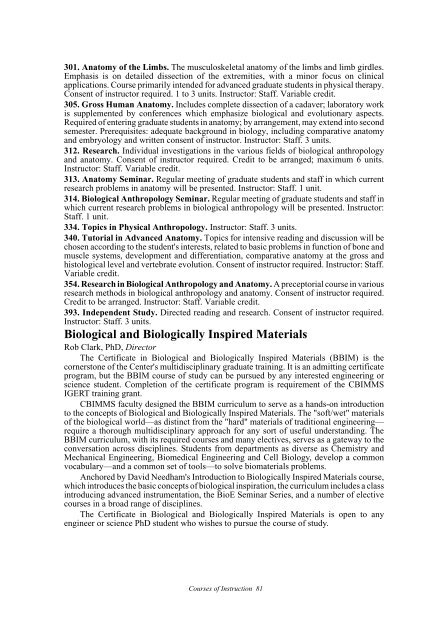Duke University 2008-2009 - Office of the Registrar - Duke University
Duke University 2008-2009 - Office of the Registrar - Duke University
Duke University 2008-2009 - Office of the Registrar - Duke University
Create successful ePaper yourself
Turn your PDF publications into a flip-book with our unique Google optimized e-Paper software.
301. Anatomy <strong>of</strong> <strong>the</strong> Limbs. The musculoskeletal anatomy <strong>of</strong> <strong>the</strong> limbs and limb girdles.<br />
Emphasis is on detailed dissection <strong>of</strong> <strong>the</strong> extremities, with a minor focus on clinical<br />
applications. Course primarily intended for advanced graduate students in physical <strong>the</strong>rapy.<br />
Consent <strong>of</strong> instructor required. 1 to 3 units. Instructor: Staff. Variable credit.<br />
305. Gross Human Anatomy. Includes complete dissection <strong>of</strong> a cadaver; laboratory work<br />
is supplemented by conferences which emphasize biological and evolutionary aspects.<br />
Required <strong>of</strong> entering graduate students in anatomy; by arrangement, may extend into second<br />
semester. Prerequisites: adequate background in biology, including comparative anatomy<br />
and embryology and written consent <strong>of</strong> instructor. Instructor: Staff. 3 units.<br />
312. Research. Individual investigations in <strong>the</strong> various fields <strong>of</strong> biological anthropology<br />
and anatomy. Consent <strong>of</strong> instructor required. Credit to be arranged; maximum 6 units.<br />
Instructor: Staff. Variable credit.<br />
313. Anatomy Seminar. Regular meeting <strong>of</strong> graduate students and staff in which current<br />
research problems in anatomy will be presented. Instructor: Staff. 1 unit.<br />
314. Biological Anthropology Seminar. Regular meeting <strong>of</strong> graduate students and staff in<br />
which current research problems in biological anthropology will be presented. Instructor:<br />
Staff. 1 unit.<br />
334. Topics in Physical Anthropology. Instructor: Staff. 3 units.<br />
340. Tutorial in Advanced Anatomy. Topics for intensive reading and discussion will be<br />
chosen according to <strong>the</strong> student's interests, related to basic problems in function <strong>of</strong> bone and<br />
muscle systems, development and differentiation, comparative anatomy at <strong>the</strong> gross and<br />
histological level and vertebrate evolution. Consent <strong>of</strong> instructor required. Instructor: Staff.<br />
Variable credit.<br />
354. Research in Biological Anthropology and Anatomy. A preceptorial course in various<br />
research methods in biological anthropology and anatomy. Consent <strong>of</strong> instructor required.<br />
Credit to be arranged. Instructor: Staff. Variable credit.<br />
393. Independent Study. Directed reading and research. Consent <strong>of</strong> instructor required.<br />
Instructor: Staff. 3 units.<br />
Biological and Biologically Inspired Materials<br />
Rob Clark, PhD, Director<br />
The Certificate in Biological and Biologically Inspired Materials (BBIM) is <strong>the</strong><br />
cornerstone <strong>of</strong> <strong>the</strong> Center's multidisciplinary graduate training. It is an admitting certificate<br />
program, but <strong>the</strong> BBIM course <strong>of</strong> study can be pursued by any interested engineering or<br />
science student. Completion <strong>of</strong> <strong>the</strong> certificate program is requirement <strong>of</strong> <strong>the</strong> CBIMMS<br />
IGERT training grant.<br />
CBIMMS faculty designed <strong>the</strong> BBIM curriculum to serve as a hands-on introduction<br />
to <strong>the</strong> concepts <strong>of</strong> Biological and Biologically Inspired Materials. The "s<strong>of</strong>t/wet" materials<br />
<strong>of</strong> <strong>the</strong> biological world—as distinct from <strong>the</strong> "hard" materials <strong>of</strong> traditional engineering—<br />
require a thorough multidisciplinary approach for any sort <strong>of</strong> useful understanding. The<br />
BBIM curriculum, with its required courses and many electives, serves as a gateway to <strong>the</strong><br />
conversation across disciplines. Students from departments as diverse as Chemistry and<br />
Mechanical Engineering, Biomedical Engineering and Cell Biology, develop a common<br />
vocabulary—and a common set <strong>of</strong> tools—to solve biomaterials problems.<br />
Anchored by David Needham's Introduction to Biologically Inspired Materials course,<br />
which introduces <strong>the</strong> basic concepts <strong>of</strong> biological inspiration, <strong>the</strong> curriculum includes a class<br />
introducing advanced instrumentation, <strong>the</strong> BioE Seminar Series, and a number <strong>of</strong> elective<br />
courses in a broad range <strong>of</strong> disciplines.<br />
The Certificate in Biological and Biologically Inspired Materials is open to any<br />
engineer or science PhD student who wishes to pursue <strong>the</strong> course <strong>of</strong> study.<br />
Courses <strong>of</strong> Instruction 81









